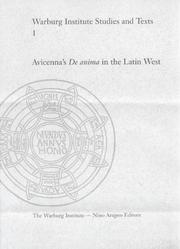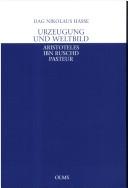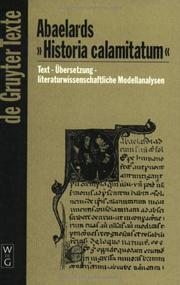| Listing 1 - 10 of 27 | << page >> |
Sort by
|

ISSN: 14715841 ISBN: 0854811257 9780854811250 Year: 2000 Volume: 1 Publisher: London: Warburg institute,
Abstract | Keywords | Export | Availability | Bookmark
 Loading...
Loading...Choose an application
- Reference Manager
- EndNote
- RefWorks (Direct export to RefWorks)
History of philosophy --- Medieval Latin literature --- Avicenna --- anno 1100-1199 --- anno 1200-1299 --- Western Europe --- Al-Hosain ben Abdallah ben Sînâ, Abou Alî --- Avicenna Latinus --- Avicenne --- Avicene --- Ibn Sīnā, al-Husayn ibn 'Abd Allāh --- Al-Hoessein Ibn Abdoellah Ibn Sînâ, Abou Alî --- Philosophie aristotelicienne --- Critique et interpretation
Book
ISBN: 0674973690 0674973666 9780674973664 9780674971585 0674971582 9780674971585 Year: 2017 Publisher: Cambridge, MA : Harvard University Press,
Abstract | Keywords | Export | Availability | Bookmark
 Loading...
Loading...Choose an application
- Reference Manager
- EndNote
- RefWorks (Direct export to RefWorks)
The Renaissance marked a turning point in Europe's relationship to Arabic thought. On the one hand, Dag Nikolaus Hasse argues, it was the period in which important Arabic traditions reached the peak of their influence in Europe. On the other hand, it is the time when the West began to forget, and even actively suppress, its debt to Arabic culture. Success and Suppression traces the complex story of Arabic influence on Renaissance thought. It is often assumed that the Renaissance had little interest in Arabic sciences and philosophy, because humanist polemics from the period attacked Arabic learning and championed Greek civilization. Yet Hasse shows that Renaissance denials of Arabic influence emerged not because scholars of the time rejected that intellectual tradition altogether but because a small group of anti-Arab hard-liners strove to suppress its powerful and persuasive influence. The period witnessed a boom in new translations and multivolume editions of Arabic authors, and European philosophers and scientists incorporated-and often celebrated-Arabic thought in their work, especially in medicine, philosophy, and astrology. But the famous Arabic authorities were a prominent obstacle to the Renaissance project of renewing European academic culture through Greece and Rome, and radical reformers accused Arabic science of linguistic corruption, plagiarism, or irreligion. Hasse shows how a mixture of ideological and scientific motives led to the decline of some Arabic traditions in important areas of European culture, while others continued to flourish.
Renaissance. --- East and West. --- Civilization, Western --- Civilization, Oriental --- Occident and Orient --- Orient and Occident --- West and East --- Eastern question --- Renaissance --- Revival of letters --- Civilization --- History, Modern --- Civilization, Medieval --- Civilization, Modern --- Humanism --- Middle Ages --- Asian influences --- Oriental influences --- Western influences --- History --- Europe --- Arab influences. --- Intellectual life --- Europe. --- Science --- Science and civilization --- East and West --- Arab influences --- Arab countries --- Civilization, Western - Arab influences
Book
ISBN: 9783487144320 Year: 2010 Publisher: Hildesheim Olms
Abstract | Keywords | Export | Availability | Bookmark
 Loading...
Loading...Choose an application
- Reference Manager
- EndNote
- RefWorks (Direct export to RefWorks)

ISBN: 9783487133065 Year: 2006 Publisher: Hildesheim Olms
Abstract | Keywords | Export | Availability | Bookmark
 Loading...
Loading...Choose an application
- Reference Manager
- EndNote
- RefWorks (Direct export to RefWorks)
Biology --- -Philosophy --- -History
Book
ISBN: 9783150140611 Year: 2021 Publisher: Ditzingen Reclam
Abstract | Keywords | Export | Availability | Bookmark
 Loading...
Loading...Choose an application
- Reference Manager
- EndNote
- RefWorks (Direct export to RefWorks)
Multi
ISBN: 9780674973664 9780674970632 0674973666 9780674971585 0674971582 9780674971585 Year: 2016 Publisher: Cambridge, Massachusetts
Abstract | Keywords | Export | Availability | Bookmark
 Loading...
Loading...Choose an application
- Reference Manager
- EndNote
- RefWorks (Direct export to RefWorks)

ISBN: 3110170124 3110850575 9783110850574 9783110170122 Year: 2002 Publisher: Berlin New York
Abstract | Keywords | Export | Availability | Bookmark
 Loading...
Loading...Choose an application
- Reference Manager
- EndNote
- RefWorks (Direct export to RefWorks)
Peter Abaelards Autobiographie, die Historia calamitatum, gehört zu den bekanntesten Texten des Mittelalters, insbesondere wegen der Liebesgeschichte zu Heloise, von der sie berichtet. In den letzten Jahrzehnten wurde über die Echtheit der Dokumente, die Abaelard und Heloise betreffen, so viel gestritten, daß die literaturwissenschaftliche Deutung des Werkes ganz in den Hintergrund trat. Aus dieser Sackgasse bietet das vorliegende Buch einen Ausweg. Es macht den berühmten Text zum Gegenstand einer Reihe exemplarischer Analysen aus der Perspektive von sieben verschiedenen Literaturtheorien des 20. Jahrhunderts (Rezeptionsästhetik, Foucault, Gender Studies, Rhetorische Stilanalyse, Literaturpsychologie, Kulturwissenschaft, Dekonstruktion). Diesen Analysen vorangestellt ist der lateinische Text der Historia calamitatum mit einer neuen, in modernem Deutsch gehaltenen Übersetzung. Damit wird die Historia calamitatum erstmals in einer zweisprachigen Ausgabe erschlossen. Peter Abelard's autobiography, the Historia calamitatum, is one of the best-known medieval texts, especially because of the story of his love for Heloise which it recounts. In recent decades, there was so much controversy about the authenticity of the documents concerning Abelard and Heloise that the critical interpretation of the texts was relegated to the sidelines. The present volume provides a way out of this impasse. In it, the famous text is subjected to a series of exemplary analyses from the perspectives of seven different 20th century literary theories (aesthetics of reception, Foucault, Gender Studies, Rhetorical Stylistic Analysis, Psychology of Literature, Cultural Studies, Deconstruction). The analyses are preceded by the Latin text of the Historia calamitatum with a modern German translation. This is thus the first time that the Historia calamitatum has been presented in a bilingual edition.
Translating into German. --- Traduction en allemand --- Abelard, Peter, --- -Authors, Latin (Medieval and modern) --- Latin authors (Medieval and modern) --- Petrus Abaelardus --- Authors, Latin (Medieval and modern) --- Philosophers --- Theologians --- Christian theologians --- Scholars --- Biography&delete& --- History and criticism --- Abaelard, Peter, --- Abaelardi, Petri, --- Abaelardus, --- Abaelardus, Petrus, --- Abailard, Peter, --- Abailard, Pierre, --- Abailardus, Petrus, --- Abeilard, Pierre, --- Abélard, Pierre, --- Abelard, Piotr, --- Abelardo, --- Abelardo, Pietro, --- Abeli︠a︡r, Petr, --- Abelʹi︠a︡rd, Petr, --- אבעלאר, --- Biography --- History and criticism. --- Latin language --- Latin (Langue) --- Abelard, Peter --- Early works to 1800 --- Authors [Latin ] (Medieval and modern) --- France --- Authors, Latin (Medieval and modern) - France - Biography - History and criticism. --- Philosophers - France - Biography - History and criticism. --- Theologians - France - Biography - History and criticism. --- Authors, Latin (Medieval and modern) - France - Biography - Early works to 1800. --- Philosophers - France - Biography - Early works to 1800. --- Theologians - France - Biography - Early works to 1800.
Book
ISBN: 9781614517740 9781614516972 9781614519355 1614516979 1614519358 1614517746 Year: 2018 Volume: 23 Publisher: Berlin ; Boston : De Gruyter,
Abstract | Keywords | Export | Availability | Bookmark
 Loading...
Loading...Choose an application
- Reference Manager
- EndNote
- RefWorks (Direct export to RefWorks)
Avicenna (Ibn Sīnā) greatly influenced later medieval thinking about the earth and the cosmos, not only in his own civilization, but also in Hebrew and Latin cultures. The studies presented in this volume discuss the reception of prominent theories by Avicenna from the early 11th century onwards by thinkers like Averroes, Fahraddin ar-Razi, Samuel ibn Tibbon or Albertus Magnus. Among the topics which receive particular attention are the definition and existence of motion and time. Other important topics are covered too, such as Avicenna's theories of vacuum, causality, elements, substantial change, minerals, floods and mountains. It emerges, among other things, that Avicenna inherited to the discussion an acute sense for the epistemological status of natural science and for the mental and concrete existence of its objects. The volume also addresses the philological and historical circumstances of the textual tradition and sheds light on the translators Dominicus Gundisalvi, Avendauth and Alfred of Sareshel in particular. The articles of this volume are presented by scholars who convened in 2013 to discuss their research on the influence of Avicenna's physics and cosmology in the Villa Vigoni, Italy.
Philosophy, Medieval --- Islamic philosophy --- Avicenna, --- Arabic philosophy. --- Avicenna. --- Hebrew philosophy. --- medieval philosophy. --- Al-Hosain ben Abdallah ben Sînâ, Abou Alî --- Avicenna Latinus --- Avicenne --- Avicene --- Ibn Sīnā, al-Husayn ibn 'Abd Allāh --- Al-Hoessein Ibn Abdoellah Ibn Sînâ, Abou Alî --- Avicenna, - 980-1037
Book
ISBN: 3110215764 9783110215762 1306968259 9781306968256 3110215756 9783110215755 9783110215755 Year: 2011 Publisher: Berlin
Abstract | Keywords | Export | Availability | Bookmark
 Loading...
Loading...Choose an application
- Reference Manager
- EndNote
- RefWorks (Direct export to RefWorks)
Avicenna's Metaphysics (in Arabic: Ilâhiyyât) is the most important and influential metaphysical treatise of classical and medieval times after Aristotle. This volume presents studies on its direct and indirect influence in Arabic, Hebrew, and Latin culture from the time of its composition in the early eleventh century until the sixteenth century. Among the philosophical topics which receive particular attention are the distinction between essence and existence, the theory of universals, the concept of God as the necessary being and the theory of emanation. It is shown how authors such as Averroes, Abraham ibn Daud, Albertus Magnus, Thomas Aquinas and John Duns Scotus react to Avicenna's metaphysical theories. The studies also address the philological and historical circumstances of the textual tradition in three different medieval cultures. The studies are written by a distinguished international team of contributors, who convened in 2008 to discuss their research in the Villa Vigoni, Italy.
Metaphysics. --- Islamic philosophy. --- Jewish philosophy. --- Philosophy, Medieval. --- Medieval philosophy --- Scholasticism --- Jews --- Philosophy, Jewish --- Philosophy, Israeli --- Arabic philosophy --- Muslim philosophy --- Philosophy, Islamic --- Philosophy, Arab --- Philosophy --- God --- Ontology --- Philosophy of mind --- Avicenna, --- Avicenna. --- Literary Reception.
Multi
ISBN: 9781614516972 9781614519355 9781614517740 1614516979 1614519358 1614517746 Year: 2018 Publisher: Boston
Abstract | Keywords | Export | Availability | Bookmark
 Loading...
Loading...Choose an application
- Reference Manager
- EndNote
- RefWorks (Direct export to RefWorks)
Avicenna (Ibn Sīnā) greatly influenced later medieval thinking about the earth and the cosmos, not only in his own civilization, but also in Hebrew and Latin cultures. The studies presented in this volume discuss the reception of prominent theories by Avicenna from the early 11th century onwards by thinkers like Averroes, Fahraddin ar-Razi, Samuel ibn Tibbon or Albertus Magnus. Among the topics which receive particular attention are the definition and existence of motion and time. Other important topics are covered too, such as Avicenna's theories of vacuum, causality, elements, substantial change, minerals, floods and mountains. It emerges, among other things, that Avicenna inherited to the discussion an acute sense for the epistemological status of natural science and for the mental and concrete existence of its objects. The volume also addresses the philological and historical circumstances of the textual tradition and sheds light on the translators Dominicus Gundisalvi, Avendauth and Alfred of Sareshel in particular. The articles of this volume are presented by scholars who convened in 2013 to discuss their research on the influence of Avicenna's physics and cosmology in the Villa Vigoni, Italy.
Philosophy --- Philosophy, Medieval --- Islamic philosophy --- Avicenna, - 980-1037 --- Arabic philosophy. --- Avicenna. --- Hebrew philosophy. --- medieval philosophy. --- Avicenna,
| Listing 1 - 10 of 27 | << page >> |
Sort by
|

 Search
Search Feedback
Feedback About UniCat
About UniCat  Help
Help News
News